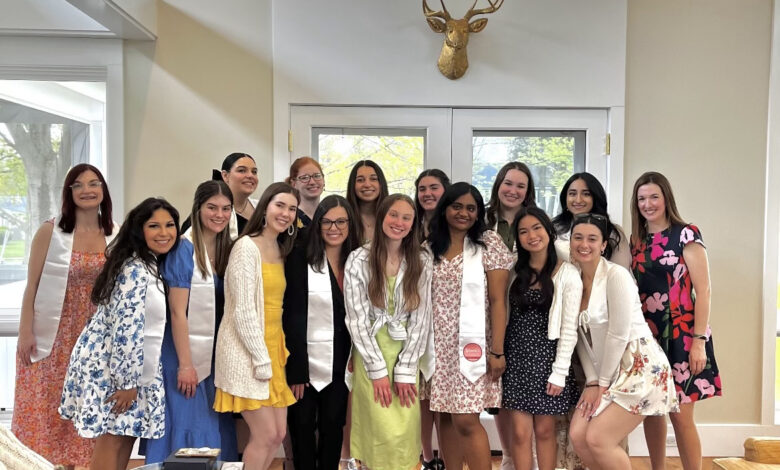
Women leaders group open to all after federal complaint
By Jake Tiger
Late in summer 2024; months before organizations nationwide began scrubbing their online presence of terms relating to race, gender and sexuality; part of a Rider community’s identity suddenly vanished from the internet.
The Gail Bierenbaum Leadership Council has provided Rider’s women students with scholarships and professional mentorship since 2013, but today, although the site still displays a photo of about three dozen smiling women, all uses of the word “women” have been erased.
In August 2024, its webpage said the group was a “community of diverse, accomplished women who champion advancing women’s leadership, mentoring and philanthropy,” according to an archived version of the website on the Wayback Machine.
The word “women” was used eight times in the short description featured on the page last summer. Now, the term is completely gone and a paragraph on women’s history at Rider was cut, as a federal discrimination complaint has flung the GBLC into an era of confusion, uncertainty and frustration.

An anonymous complaint
Junior environmental science major Nicole Filipowicz, the council’s president, said the change took place over the summer after Rider received an anonymous complaint, via the Department of Education, accusing the group of discrimination.
The GBLC offers professional mentoring and scholarships of $1,000 per year to its members, which has been solely women up to this point.
The resources are used to propel women into high-ranking leadership positions, which they have been historically shut out of. The exclusivity of both the group and its valuable professional resources were the target of the complaint.
As a result, the council removed all gendered language from its website and branding, and beginning with the GBLC’s summer 2025 selection cycle, it will no longer take gender into account when choosing new members with the most important qualifier being the applicant’s values and passion for women leadership, according to Filipowicz, who has been a member of the GBLC since her freshman year.
“We’ve always strove to be as inclusive and welcoming as possible as a club, but we are an organization that specifically focuses on developing women leaders. … That’s still our mission and that will always be our mission,” she said. “We just are trying to make it a little more obvious now that we are open to anyone who wants to promote women leadership, no matter how you identify.”
GBLC Director Kim Barberich canceled a scheduled interview with The Rider News, stating over email, “This is a rapidly changing area within higher education as well as other domains, and as an administrator at Rider and Director of this program I am carefully monitoring changes on a daily basis. Because of this I do not want to discuss it at this time.”
Program Coordinator Erin Barnard also declined an interview with The Rider News, citing Barberich’s concerns.
Filipowicz said she received the information about the complaint from Barnard, who spoke with a Rider lawyer, and she said the DOE offered little detail to maintain the filer’s anonymity.
“With the little information that we were given, Erin [Barnard] did tell us that … it was more likely an attack on our mission of uplifting women and an attempt to try and push that down,” she said.
‘A bad idea’
Along with gendered language being completely cut, the current version of the website no longer contains a section reading, “Since Rider opened its doors in 1865, women were welcomed into the classroom. In 1866, Rider created the Ladies Department because women could ‘comprehend the full bearing of a business transaction…quite as readily as men’ and graduated the institution’s first female student, Marian Ashton, in 1867. Today, women comprise over 50% of our students and alumni.”
The erasure took place in August and was not related to President Donald Trump’s recent crackdown on diversity, equity and inclusion initiatives,Filipowicz said.
According to Filipowicz, Barnard mentioned there was “some upsetness” and “a lot of confusion and questions” among the GBLC’s external professional mentors. The organization has around 25 women mentors, each with high-ranking leadership positions, who regularly meet with junior and senior GBLC members to provide one-on-one guidance.
Critics of the change said, while it is important to be mindful of inclusivity, opening up the group and its resources to all genders, including cisgender men, who have historically dominated leadership positions, could weaken the group’s ability to bolster women.
“I was shocked and I was sad,” said Ellyn Ito, a CEO and GBLC professional mentor. “I’m still sad, but I recognize that institutions don’t have the bandwidth or the resources to try and fight the mandates by the white, male power structure.”
Ito and other mentors were informed by Barberich over the summer that the decision was made after considering the pressure and allegations of discrimination other universities were facing regarding their identity-based programs, she said.
Erica Ryan, director of Rider’s Gender and Sexuality Studies program, thought opening the council’s scholarships and opportunities up to everyone was a “bad idea” and wished the university was more equipped to rebuke the complaint.
“The fact that those resources now have to be open to everyone, when it seems there are certainly reasons why women would need those resources to address some of those inequities, that is really important to me,” Ryan said. “I wish there was a way we could fight it legally. I don’t think it’s necessarily modernizing in a good way to take away programs that are trying to address inequities that exist.”
Filipowicz was confident the recent changes would not cloud the values of the GBLC, saying the council’s selection process would be able to detect students who might now be applying for reasons that do not align with the group’s goal of uplifting women leaders.
“We look into a candidate and see if they really have a passion for the program,” she said. “I have no reservations about the upcoming interview process, because I know if anyone wants to be a part of our organization for the wrong reasons, that will come out in the interview process. … We’ve always had people applying primarily for the scholarship, and the interview process has tended to weed those people out.”
Sports Editor Kadie DiGiuseppe, Social Media Editor Kaitlyn Seawood and Copy Editor Brianna Velazquez are members of the Gail Bierenbaum Leadership Council. They had no part in the writing or editing of this story.


